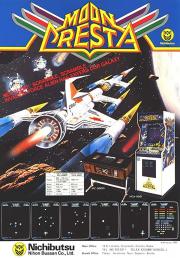Moon Cresta
In 1980, Moon Cresta offered players not simply an arcade diversion, but an allegory of futility dressed as interstellar combat. Its gameplay—simple yet punishing—places the player in control of fragile ships, docking and redocking them, only to watch their inevitable destruction. The design rewards persistence but never promises permanence; no victory is final, no ship immune from loss.
This cyclical struggle reflects the absurdity at the heart of human existence. Like Camus’s vision of Sisyphus endlessly pushing his stone, the player pilots onward, wave after wave, toward a horizon that recedes with every triumph. Each successful docking feels like a momentary reprieve, a fragile illusion of control, swiftly shattered by the cosmos’ indifference.
And yet, in that very indifference lies the game’s strange dignity. The joy of Moon Cresta is not in conquering the void, but in the act of resisting it, however briefly. To play is to accept mortality, to affirm one’s will against futility. The neon cosmos becomes not a space of conquest, but of defiance.
Thus, Moon Cresta embodies a paradox: its limitations are its philosophy. The player may never master the stars, but through play, they embody the courage of continuing without hope of resolution. In that persistence—arcade token after token—we glimpse the absurd hero, smiling at the endless void, continuing the fight simply because it is there.
This cyclical struggle reflects the absurdity at the heart of human existence. Like Camus’s vision of Sisyphus endlessly pushing his stone, the player pilots onward, wave after wave, toward a horizon that recedes with every triumph. Each successful docking feels like a momentary reprieve, a fragile illusion of control, swiftly shattered by the cosmos’ indifference.
And yet, in that very indifference lies the game’s strange dignity. The joy of Moon Cresta is not in conquering the void, but in the act of resisting it, however briefly. To play is to accept mortality, to affirm one’s will against futility. The neon cosmos becomes not a space of conquest, but of defiance.
Thus, Moon Cresta embodies a paradox: its limitations are its philosophy. The player may never master the stars, but through play, they embody the courage of continuing without hope of resolution. In that persistence—arcade token after token—we glimpse the absurd hero, smiling at the endless void, continuing the fight simply because it is there.
Mini Review: In Moon Cresta, the void becomes a stage for our fragile persistence. Ships fuse, separate, and perish, echoing the absurd cycle of striving without resolution. The challenge compels us forward, yet each victory is provisional, each loss inevitable. It is not triumph that defines the experience, but the dignity of playing on despite futility.

